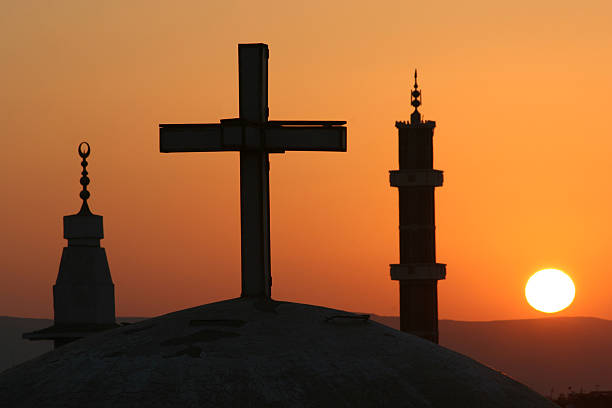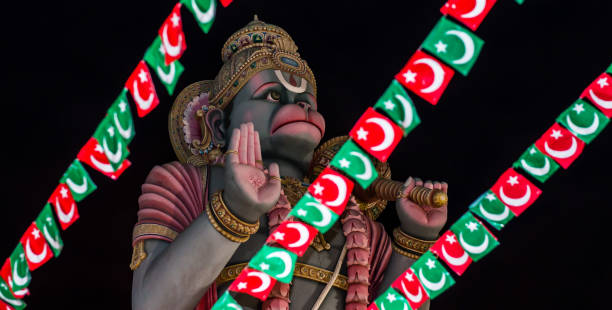
Is the growing religious nationalism a threat for India? How are these religious communities driving the society and are taking control over the people and are manipulating their opinions? Religion in India has always upheld its position at the top. More than a firm belief, Indians have an Adamant belief system in their religion.
Every Religion has been backed by its communities for disseminating its religious belief. Whenever communal Riots occur, groups like RSS, Bajrang Dal come into the picture because they have been affiliated with the political party. But surprisingly there are a notable 109 Hindu communities that are in a continuous effort to shape society according to their beliefs. In India, the Muslim population ranks the chart at 2nd position. 50 Muslim Organizations have been influencing the behavior and shaping values in line with the faith beliefs.
Thomas the Apostle, who had introduced Christianity in India, is now the third-largest religion. 34 Christian organizations are have been practicing Christianity in India. In a heterogeneous country, where the constitution aims at providing equal rights to every religion, still, the religious fanatics create chaos in the operation of the country.
Do we practice what we preach?
Conversion has always been a matter of discussion and in 2021 nine states have enacted laws against proselytism. There have been recorded instances of Christian proselytism in the country. In India, many Christian converts originated from Hinduism. They converted because they came from poor backgrounds, where they were struggling economically and for other necessities.
In December 2017, a Catholic priest George Mangalapilly along with his 32 seminarians from Madhya Pradesh were singing Christmas carols. They were being brutally attacked by the Bajrang Dal and summoned for converting Hindu to Christianity. " It was a harrowing experience. I was sure justice would be done to me as the charges were fabricated and I was falsely implicated." As the Indian law- system has always delayed in providing their judgments, the innocents have to bear the repercussions. On September 29, the Supreme Court dismissed the false charges and proved the priest as non- accused. Radical Hindus have targeted Christian leaders several times to spread a false message to justify their attacks on Christians.
Not to derogate from the forceful conversion issue, Christians have been condemned for forceful conversion. In 2020, Yogi Adityanath had passed the Uttar Pradesh Vidhi Virudh Dharmantaran ordinance to terminate the forceful conversion. Despite this, on September 11, the police had arrested a 40- year man who was found guilty of converting his neighbor to Christianity. Sachin Dwivedi, his neighbor, was also given a sum of Rs. 12000 to start his new business if he converts to Christianity. After the investigation, it was also found out that the man had been involved in conversion by offering lump-sum money.
The uncertainty of the conversation had led to all sorts of paradoxes, like the Constitution states the Freedom of Religion, practicing Diversity in India and whatnot. All these practices have put a full stop to the freedom to choose a new faith.
A Fake Diversity and the Propaganda
Almost every country has acknowledged the diversity of India. Diversity is intertwined with religion and culture. Awfully recently, the police had arrested two persons for ruthlessly beating a man who drooped Muslim women on his bike. The founder of Srirama Sene, Pramod Mutalik denounced this act, “ It is a systematic ploy to single out Hindus and spread animosity among the communities. The woman’s husband and family members were also called to know if they knew that she was with her colleague. To the accused’s displeasure, her family members were aware of the situation. The women had inquired about what was wrong with the incident. To her surprise, the accused replied, “ You can be free to go anywhere with anyone, without earring the burkha, as the action goes against the community. The accused kept their stand by saying, “ The Woman has given a wrong message to the Muslim community, that it is appropriate to roam with a man who is not her husband with burkha on. There have been no such rules for women but despite that extremists have been oppressing the people.
By practicing Fake Diversity, these religious communities have started to monopolize their religion. Due to the authoritarian rule of these communities, it is interfering in the functioning of the country. There has been a debate among the Muslim Community, whether they should take the vaccine jab or not. The Muslim Bodies had argued that the Covid-19 vaccines with pork gelatin can't be given to Muslims as the Covid-19 contains pig-derived Gelatin. Later, however, the Muslim leaders have gone through the Quran, which states," the use of haram items has been allowed to save a person's life." Many of the Muslims were hesitant to take the jab, due to their religious restraints. But, Maulana Khalid Rashid Firangi Mahali, a Muslim leader in Uttar Pradesh advised people to take the vaccine and not add to the country's problems.
Not only interfering in the country's functioning but the Muslims have been involved in having links with the terrorist groups. ISIS (the Islamic State of Iraq and the Levant ) and AQIS (Group of Base of Jihad in Indian Subcontinent). 200 people from India have joined these organizations.
Last year, Pakistan had alleged that four Indians should be declared terrorists as they were financing, sponsoring, and organizing the terrorism in Pakistan and supporting the terrorist groups in Pakistan. United Nations Security Council had declared Maulana Masoor Azhar, a militant outfit in New Delhi, to be involved in the 2008, Mumbai Attacks.
All these religious propagators are degrading the core values of our society. Due to their adamant behavior, they are fragmenting society into parts and leading to internal conflicts.
The Blame Game
The religious conflicts have been there before the Independence. Then why are the ordinary public and the religious communities targeting a single person? The blame is just being shifted from one leader to another, but no one finds a solution to the ongoing fight. Narendra Modi has been targeted since the Godhra Incident. His only fault was that he was a Hindu leader. The Non- Hindu practitioners carried out a vicious campaign, to prove Mr. Modi guilty and to accept that he was responsible for 1000’s Muslim’s Death. No one denies that there has been killing of Muslims, by Hindu Extremists who didn’t belong to RSS, BJP, VHP (Vishva Hindu Parishad), and Bajrang Dal.
Until now, no one has raised a voice when Hindus were killed. Muslim leader Owaisi had commented, “ Take away the police for three days and the Muslims will teach Hindus a good lesson. The killing of any religion has to be stopped and the growing animosity has to be taken in control.
Looking at all the circumstances India can’t be declared a secular nation. Originally this word was incorporated in the Constitution when most of the opposition MP’s were in Jail and were not allowed to vote. Diversity was an important asset of India, which has now proved to be catastrophic. These religious leaders are driving the country on their terms and have interfered in the nation’s progress.
What our Constitution has to say?
Article 25A of the Constitution entitles every religion to profess, practice, and propagate its beliefs equally. Article 26 states that all cults can handle their matters in terms of religion. Unless and until it violates any rule or is involved in terrorism or sedition, the government won’t be involved. 19,000 temples in India come under the government’s rule. According to the Constitution, the temples are not just a place of worship, but also a place of community.
Article 30 has stated every minority based on religion or language can set up their educational institutions and spread the teachings. The Minorities include Muslims, Christians, Buddhis, Sikhs, Parsis, and Jains. The government has no fundamental right to discriminate against any religious educational institutions. Article 30(1A) deals with the fixation of the amount for acquisition of property for religious educational institutions.
Despite all the fundamentals mentioned in the Constitution and the services provided equally to all the religious, the friction between all these religions is increasing and the extremists and the communities are adding fuel to the ongoing conflict. Is being diverse, really India’s forte? A lucid answer is No.
Image- Istock, Getty Images, Pixabey
Share This Post On
0 comments
Leave a comment
You need to login to leave a comment. Log-in





